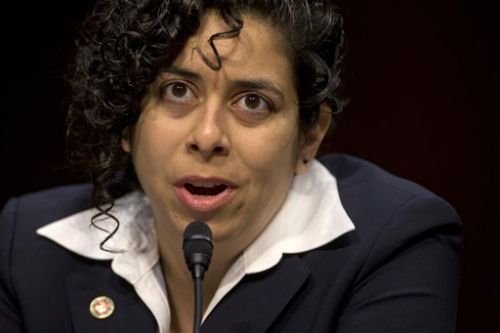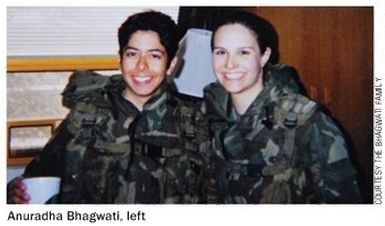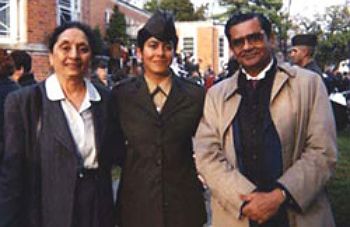
The butch-looking Anuradha Bhagwati was a former Captain and Company Commander in the Marine Corps. She served in the Marines from 1999-2004 (going one year beyond the minimum requirement of four years). She was honorably discharged from the Marines in 2004 and completed her graduate education, receiving and a Masters of Public Policy from the Kennedy School of Government focusing on international human rights policy. She already had a B.A. in English literature from Yale University, before entering the army. Bhagwati is also a 2010 Petra Fellow, which is an award given to:
...unsung individuals making distinctive contributions to the rights, autonomy and dignity of others...Bhagwati's special qualities that earned her the Petra Fellowship include being ignored or by-passed for her accomplishments. As the Petra Foundation, which finally and generously recognized her, informs us:
Often at risk and without the safety net of personal privilege or institutional support, Petra Fellows fight poverty, discrimination, environmental degradation and violence. They work in prisons and police departments, factories and migrant worker camps, health clinics, housing projects, family farms and public schools—wherever people lack the resources, connections or clout to participate fully in American society. [Source: The Petra Foundation]
When Anu Bhagwati finished her first three-mile fitness run at Quantico ahead of all of the women and most of the men in her platoon, her drill instructor accused her of skipping a lap. When she stood up in a basic training class of 300 to inquire when submarines would be gender-integrated, she was loudly booed. And when she could no longer stop or stomach the sexual harassment being directed at female NCOs by her second-in-command, her formal complaint was not only disregarded but the offending lieutenant was promoted to command a gender-integrated unit. [Source: Petra Foundation]

Bhagwati with a fellow (female) marine. Her colleague
could muster some femininity, even in the Marines,
unlike Bhagwati's androgynous, young boy, look.
After she left the Marines, Bhagwati co-founded Service Women's Action Network (SWAN) , and served as its first Executive Director.
Under Anu’s leadership, SWAN has spearheaded legislative reform and litigation to end military rape, sexual assault, sexual harassment, and domestic violence, and to eliminate all barriers to equal opportunity for service women. [Source: SWAN Executive Staff]Bhagwati says about her time in the Marines:
I served for five years, with many gay and lesbian Marines, both enlisted and officer.Baghwati has an interesting background. Her parents are academics, with professorships at Harvard and Columbia and at least two books between them. Her father, Jagdish Bhagwati, speaks highly of his daughter:
My best friend in the Marines was an incredible officer. She was also a lesbian. Because of this, she wasn’t allowed to live a normal life. While I could walk down the street holding the hand of my male partner, she could not do the same with her loved one, for fear of being outed.
Despite the enormous strain of living under the Don’t Ask Don’t Tell policy, my friend volunteered to serve for a year in Iraq, knowing that because she was lesbian, she wouldn’t be able to easily correspond with her partner back home. A couple of years after returning home from Iraq, she was discharged under the Don’t Ask Don’t Tell policy.
What happened to my friend was unfair, wrong and un-American.
Unfortunately, my friend’s story is all too common, especially as it concerns women in the military. While women make up only 15% of the entire armed forces, they make up almost 50% of last year’s Army and Air Force discharges under Don’t Ask Don’t Tell.
Race is another relevant factor in these discharges. African-American women are discharged under Don’t Ask Don’t Tell at three times the rate that they serve in the armed forces.
These statistics are not evidence that the military is upholding unit cohesion, good order and discipline, or any of the other convenient catch-phrases used by proponents of this archaic and useless policy. These statistics are, at the least, shocking, and at the worst, shameful.
Numbers like this originate from an ugly context, which we must discuss. Sexual harassment of women in uniform is pervasive. Lesbian-baiting is simply another insidious manifestation of sexual harassment. Many servicewomen risk two equally devastating prospects, as far as their professional careers are concerned: resist a serviceman’s advances and be labeled lesbian, or don’t resist, and get labeled promiscuous. Being labeled a lesbian, even by rumor, can prompt an investigation that ends in discharge. [Source: Service Women.org]
"...we are proud of her accomplishments, - particularly since they are based on social engagement that characterized our own parents almost 100 years ago, and are the jewel in the crown of the State of Gujarat from which we come, as did Mahatma Gandhi - but because it shows that none of what Anu has accomplished would have happened if she had not joined the Marines in the first place." [Source: The American Interest]

Bhagwati with her parents in her Marine uniform
Here, he's trying to understand his daughter's choices, and sympathizes with her "social conscience," that is also part of his (and his wife's) background.
"She is consumed by Human Rights work," Professor Bhagwati has said about Anuradha. When his 70th birthday was being celebrated, she could not make it to the event because of her political commitment in Palestine.One can also see where Bhagwati acquired her narcissism. Her parents give lavish praise and attention to their only daughter. Yet, as is characteristic of narcissists, one gets the feeling that Bhagwati resented their standards which she could never achieve, and her stint in the Marines was a way escape this family's high expectations. Even her post-Marine efforts with graduate work in Harvard and working on a novel, all seem to emulate these pleasant but demanding parents.
"She's our joy," her father said at his birthday celebration, the New York Sun reported in its account of the event. "And while I miss her tonight, I am delighted that it is in a good cause. After all, that is what counts."
Here in this video, she says exactly that:
I had a very unique childhood. I mean, it was all about my parents. Obsessively so about the pressure of like getting into the top schools. And then I went to the top schools, and I was miserable. I just wanted to travel the world, go to war-torn areas and meet people and learn languages, and find out how people lived...I left grad school like mid-semester, and joined the marines [she completed a Masters in Public Policy after her discharge from the Marines].Her parents seem to vacillate between leftist Third World positions and a capitalist Western lifestyle, which is often the behavior of committed, elitist ideologues: they want all the amenities of the West, but will promote ideologies that could destroy it (with them sheltered in safe havens). This can't have been a very stable environment for Bhagwati to grow up in.
Bhagwati père came to the US in 1969 to study economics at MIT. He is linked throughout his career with leftist institutions. He served:
...as an external advisor to the Director General of the World Trade Organization in 2001, as a special policy advisor on globalization to the United Nations in 2000, and as an economics policy advisor to the Director-General of the General Agreement on Tariffs and Trade from 1991 to 1993. From 1968 until 1980, Bhagwati was an economics professor at the Massachusetts Institute of Technology. Bhagwati currently serves on the Academic Advisory Board of Human Rights Watch (Asia) and on the board of scholars of the Centre for Civil Society. He is a Senior Fellow of the Council on Foreign Relations. [Source: Web India]Her mother, Padma Desai, is linked with similar leftist ideological bodies. She served as:
...US Treasury’s Advisor to the Russian Finance Ministry (1995), [and] she is regarded as a leading scholar today on the Soviet Union and Russia. [Source: Celebrating Padma Desai, Columbia University]There is a strange moment in Desai's life where she:
...won a scholarship to the US [from India] and never went back [to her first husband]. In the end, faced with his refusal to grant her a divorce, she converted to Christianity, because under the Indian law, religious incompatibility is a ground for divorce. The suggestion had actually come from him and she converted. She describes in moving detail how the forlorn ceremony took place on a rainy day in a small village in Gujarat. [Source: Random Truths and Common Threads, in The Hindu Business Line].It is one thing to have leftist parents, another to have a first marriage in her mother's history, but how about her mother's conversion to another religion to facilitate her personal life?
After Desai gets her PhD from Harvard, she returns to India to teach at the Delhi School of Economics, and meets Jadish Bhagwati. They immigrate to America with a position for Bhagwati at MIT, but:
more importantly in order for Desai to make a clean break from her bad first marriage. [Source: Time Out India]More on her mother's divorce, and her second marriage:
[T]he incredible legal entrapment of the Hindu Marriage Act of 1955...drove Desai to a phoney religious conversion - the only permissible grounds for a judicial separation, if her husband agreed. He did - after years of denying her a divorce - then recanted. Her Christian conversion was in vain. Eventually, in 1968, she followed Bhagwati to Boston, won a position at Harvard, and freed herself via a Mexican divorce before she could remarry...Eventually, she finds [a] life (and an exciting career) in America, with the ever charming and lovable Bhagwati, first at Harvard and then at Columbia. [Source: The Hindu]Their daughter, Anuradha Bhagwati, was born in New York in 1976 (I calculated her birth date from this article, written in 2008, and which cites her age then as thirty-two). I find it important to know how soon after her parents immigrated to the US Bhagwati was born. She's had the typical, complicated life of a child of Third World of immigrants who arrived in the US after:
...the 1965 Immigration Act which opened U.S. immigration on an equal basis to every country in the world, rather than, as in the past, favoring our historic source nations of Europe. Of course many of the recent immigrants from non-European countries have fitted into America and made good contributions here. It is the unprecedented scale of this diverse immigration that is the problem. [Source: View From the Right"]When Bhagwati's parents came to the US in the mid-sixties, multiculturalism was just becoming an accepted way of cultural life. By the time Bhagwati was born, it was a part of American life. I wouldn't be surprised if growing up, her life was full of reminders of the country her parents left behind, from the food, to the music, and the friends and relatives who frequented their home. So although she grew up in America, hers was a specific, ethnically restricted, America. I think this speaks of her behavior at the hearings, her victim stance, her repeated blame on racism for her discharge, and her particular singling out of white men leaders in the military as those who prevent non-whites (and of course women) from advancing in the military.
Here is a fascinating video of Bhagwati rambling on in free-style fashion about the evils of the military, misogynistic white men, fighting wars, and the hegemonic empire that is the United States. The video is titled: "Interview With a Reluctant Veteran: Anuradha Bhagwatl." I've transcribed it below from around the 15 minute point in the video to the end, to show the quality of her mind.
And when I see the usually white men who are providing the, I don't want to say, the state version, it's really how it seems at times [laughs while she says this], the state version of events and the state version of how you should operate in Iraq or how you should fix the military or improve and take care or support our troops, which is the biggest slogan of them all, you know, it feels very odd for me to have the same status, you know this veteran status. It feels very awkward. Because I wonder if they are having any intimate conversations with anyone about anything. I mean there are things that happen to every soldier's soul in that institution, regardless of where he or she comes from originally, political baggage, all of that. There's something that happens to their soul, and I'm not sure that enough of them examine what it is that happens. It's a very fragile thing, dealing with force and violence. You don't even have to physically hurt somebody, and you could have, you may have committed an act of violence upon them in what you bring to the table. And the society I don't think understand the ramifications of this, the violence. There is an indoctrination in any army that comes with the training. And any time that the nation perceives itself to be at risk of annihilation, well you know, or invasion, to use a smaller term, the existential issue of Israel, for instance, where you have so much more national ideology at play, and the basic indoctrination of the soldier, all politics aside, I mean that is how literally how Israelis are trained, so you think you're defending your individual family, you know, and societal existence, whether or not that's true. And you'll believe it, and you'll fight and kill, you know, to the end. You know, in a case like India I would imagine that was true at least on a partial scale, because of historic conflicts with neighbors to the north, right. But I don't know, I've talked to members of the military from South Asia, of various nations, there's something slightly more intellectual about their approach to, but I'm sure not everybody, but the few that I've talked to, about their role in the world. The thing that makes an American soldier stand out is his country's role in the world that bleeds into his ideology about where he thinks, who he thinks he is. Completely inflated sense of self. And it's unfortunate, right, because it prevents him from actually reaching out to people from other countries and cultures. It's a shame, in fact, it's a shame. Because it prevents him from being human, right. And so, yeah. I'm not saying, you known, that this is the American condition, and it couldn't ever happen. I think any hegemonic empire that this is the result, right. It's our turn, in the United States. [Source: Kran Film Collective]This is someone who reached the rank of Captain in the American military. This is the type of soldier who is out in the fields, representing American soldiers. It is not an issue of women in the military anymore, it is an issue of Third World minded, anti-American, anti-military soldiers who are becoming a real detriment to America.
This is who represents America now.

The face of the victimized, feminized, Third World,
anti-American former soldier.
This is who will save America?
-------------------------------------------------------------------------------------------------------------------------------------------------------------
Posted By: Kidist P. Asrat
-------------------------------------------------------------------------------------------------------------------------------------------------------------
